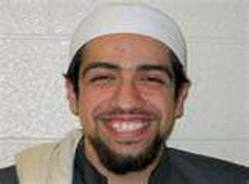 In this follow-up to the “Muslims Raise 29K to Bring Muslim Chaplain to University of Michigan” article, we learn the US has become a little more Islamic. More Islamic because Islam has gained more power, with the university bringing in a Muslim chaplain.
In this follow-up to the “Muslims Raise 29K to Bring Muslim Chaplain to University of Michigan” article, we learn the US has become a little more Islamic. More Islamic because Islam has gained more power, with the university bringing in a Muslim chaplain.
Milestone At University Of Michigan: Muslim Chaplain
Although the population of Muslim students is growing, there are only about 30 Muslim chaplains at colleges across the country. This semester, the University of Michigan became the first public university with an endowed position for a Muslim chaplain.
“Muslims need to rely on somebody through times of hardship,” says Mohammed Tayssir Safi, who was recently hired to serve as the university’s Muslim chaplain.
How about they rely on their family, friends, and/or a regular student counselor?
Safi will help an estimated 1,700 Muslim students maintain their beliefs on campus.
Therein lies the problem. Islam does not assimilate, it ends up dominating.
The transition to college can be a difficult one for Muslim students who often come from tight-knit immigrant communities centered around mosques. Keeping their faith can be challenging since college life glorifies alcohol and premarital sex, which are forbidden by Islam.
At a gathering of Muslim students at a Middle Eastern restaurant Safi says, “There’s not a solid environment where a Muslim feels, perhaps, safe is the right word. Not from violence, but safe as in they feel safe and at home in being able to express themselves and who they are.”
That is because Islam does not belong in America, and they should not be catered to at all. If they love Islam so much, they can move to an Islamic country.
Funding A Religious Position
Although he’ll work with students, Safi’s salary won’t be paid by the university.
“The university is very supportive of the idea, but they can’t lend even a penny towards the cause because of separation of church and state,” says Chris Abdur-Rahman Blauvelt, chairman of the Michigan Muslim Alumni Foundation.
Blauvelt reached out to fellow alumni and parents for donations through a crowd-funding campaign and raised $30,000 in a matter of months.
So the university couldn’t pay for it, and Muslims go out and get their own funding. What else should they be allowed to bring onto the campus? Maybe an Islamic enclave? When does this slow suicide end?!


the level of laziness and stupidity in america by americans today is mind boggling.you can show proof and put it in their face but as long as it doesnt affect their lives they dont care.
this is how germany must have gotten out of control,people living good and not caring til it was too late.
we better wake up.i beleive its too late.but u never know.i also beleive we will be fighting here in the streets soon.
Hey Mike, yes you show proof and many Americans will just deny it. All in an effort to stay in their false comfort zone. I find this action cowardly and selfish. As it is their future generations who will suffer under Islamic Law, if Islam is not stopped.
So, now are you still voting for Obama, the muslim?
This is the change he was tlaking about and this the way America will be governed, by sharia and muslims.
I wish Americans do something now, I know we’re suffering from them in ?Egypt. Obama caused all the problems in the Middle East and he and Hillary gave them the ok to roam the world
What an ugly, grinning pig.
He is actually quite Handsome. Kudos to the UofM!
What is your favorite part of Islam? Slavery, child marriages, amputation?
I think all Americans must wake up before it is to late
We as Christians should stand up and be counted the longer Christians and others ignore the Muslim threat the bigger the chance of a world wide blood bath further down the road.
I think the general idea behind most people blindness to the spreading Mulsim threat is they think it will just go away.
They do not realise at the moment there are ways other than war/bloodshed and so on to solve this problem but if we leave it another say 30 years that same war/bloodshed might be our only option.
Beware of the False Prophet and the changes of Gods word the devil is within them whether they know it or not
Welcome to the site fellow infidel!
Grant welcome to the site!!
It’s wrong for any taxpayer funded college to provide an office (room, desk, phone,etc) for any religion. The UM needs to have its funding cut off of all taxpayer money.
I think these two statements say it all:
“Therein lies the problem. Islam does not assimilate, it ends up dominating.”
“That is because Islam does not belong in America, and they should not be catered to at all. If they love Islam so much, they can move to an Islamic country.”
The first one alone, should send up the alarm. We all know what happens to those who do not conform to their beliefs. Just ask the families of those who have been beheaded in the name of allah, or the girls and women who have been murdered by fathers and brothers, calling them “honor killings”. Wake up America.
Thanks infidel friend!
A statement by Chief Downing that CAIR is problematic raises strong concern as well the facts and findings about CAIRS criminal involvement.The Townhall meeting at Islamic Centre of Orange County hosted by Imam Muzammil Siddiqi who has a very questionable if not criminal background sees no contradiction between the normative values of Islam and the Us Constitution, unless he admitted it, is against his god. A despicable statement while non-muslim in muslim countries are getting slaughtered en- masse.Gary Fouse of garyfouse-blospot.com was
A statement by Chief Downing that CAIR is problematic raises strong concern as well the facts and findings about CAIRS criminal involvement.The Townhall meeting at the Islamic Centre of Orange County hosted by Imam Muzammil Siddiqi who has a very questionable if not criminal background sees no contradiction between the normative values of Islam and the Us Constitution, unless, he admitted it, is against his god. A despicable statement while non-muslim in muslim countries are getting slaughtered en- masse.Gary Fouse of garyfouse-blospot.com was reporting this farce of a Townhall Meeting. Stop Muslim immigration and deport muslim offenders, as the are recruiting criminal elements in the prisons and their poison is spread even among Americans.